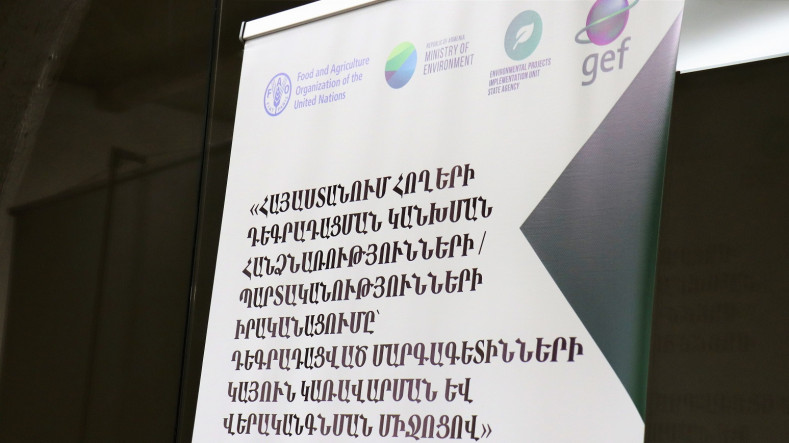
FAO brings together stakeholders in Syunik to kick of project combatting land degradation
The Food and Agriculture Organization of the United Nations (FAO), in partnership with the Environmental Projects Implementation Unit (EPIU) under the Ministry of Environment of Armenia held a workshop in Goris town to officially kick-off of a project in Syunik region aimed at supporting Armenia in providing a comprehensive solution to land degradation in the country, FAO reported.
This three-year project, entitled “Implementation of Armenia’s Land Degradation Neutrality (LDN) Commitments through Sustainable Land Management and Restoration of Degraded Landscapes,” is funded by the Global Environment Facility (GEF) and implemented by FAO in partnership with the EPIU.
The workshop aimed to bring together relevant local-level stakeholders and participants in Syunik region to discuss the most effective means of implementing this project.
Armenia’s Deputy Minister of Environment Tigran Gabrielyan mentioned in his speech that there is effective cooperation between the Ministry and the FAO. Referring to the Government's 2021-2026 strategic programmes for intersectoral development in environmental protection and food security, the Deputy Minister stated that significant attention is devoted to improving the balance of natural resources, promoting ecological agriculture, reducing negative impacts on the environment, and combating desertification and land degradation.
Gayane Nasoyan, Assistant FAO Representative in Armenia, emphasized the importance of the project in promoting land degradation neutrality in Armenia and achieving the UN sustainable development goals. “Sustainable land management is the foundation for better production, better nutrition, and a better environment, resulting in a better life,” Nasoyan said. She added that this project is targeting communities of Sisian (former Gorhayk) in Syunik and Tumanyan in Lori regions.
Land degradation and desertification in Armenia are caused by both natural and anthropogenic (man-made) factors. Human-induced causes include inefficient agricultural practices, such as lack of crop rotation, inefficient use of irrigation techniques, overgrazing of pastures, violation of ploughing rules, as well as illegal logging, overuse of groundwater resources (artesian wells), soil contamination, mining, urban development, and road construction. In addition to these causes, climate change is increasing the risks for the agriculture sector in the country, exacerbating land degradation processes.
This project follows a landscape approach in line with GEF's vision to foster sustainable integrated landscapes to achieve land degradation neutrality. This approach allows problems to be addressed in a multifaceted way, integrating sectors, involving several stakeholders, and working at different scales to tackle the underlying causes of land degradation and challenges related to food security.
Representatives of the Ministries of Environment, Economy, and Territorial Administration and Infrastructure, project funding and implementing agencies, civil society, academia, and the private sector, among others, gathered at the workshop and welcomed the initiative. The project is expected to make a significant contribution to increasing sustainable land management and achieving land degradation neutrality in Armenia.
Newsfeed
Videos






























